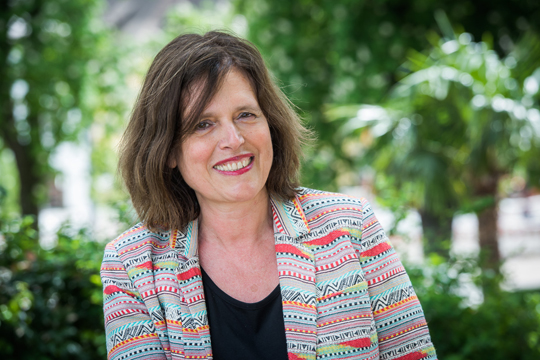On the high seas
Freiburg, May 15, 2018
Europe, the Caribbean, South America: In the 17th century, the Netherlands’ expansion as a trade and colonial power helped spread the Dutch language well beyond European borders. Today Dutch is the official language in six countries: the Netherlands, Flanders, St. Maarten, Curaçao, Aruba and Suriname. In addition, the Dutch derivative language Afrikaans is spoken in both South Africa and Namibia. In a series about seldom-learned languages, Christine Hohlbaum talked with the lecturer Annelies de Jonghe about the advantages and the possible misunderstandings of Dutch.

In 2003 Annelies de Jonghe started her position as a lecturer at the University of Freiburg. In 1984 the Brussels native came to Freiburg for the first time for advanced training and dreamed of returning to Freiburg for good one day. In 1991, her wish came true. Photo: Klaus Polkowski
Ms. de Jonghe, why is Dutch considered one of the seldom-learned languages?
Annelies de Jonghe: At the moment about 400,000 people are studying Dutch in 40 countries worldwide. Muenster, for instance, has the largest Dutch department in Germany with 400 students. Dutch is less popular in Southern Germany than in Northern Germany, however. Freiburg is located too far away from any Dutch-speaking area. A lot of people learn the language on their own -- that is, until they notice it has less in common with German than they first thought.
What are some of the reasons people should learn Dutch?
There are too many to count? For one, I have often noticed that love motivates a lot of students to learn the language as soon as possible. For another people gain not only a language with Dutch, but also access to multiple countries worldwide. It makes studying history and art history easier because a lot of historical works are written in Dutch.
Which Dutch expression should everyone learn?
Everyone should learn the expression “ ’t Komt goed!” It means “We can do it!” The saying illustrates the positive mentality of the Dutch. It also hints at the country’s maritime history. When a large wave comes, they always believe everything will be alright.
What is your favorite word?
I have two favorite words: “grappig” (funny) and “fiets” (bicycle). When I think about the Netherlands and Flanders, I immediately think about these two terms.
What “false friend” should people look out for in Dutch?
The Dutch language is full of them. German-speaking people often think they understand the language without any problems. But misunderstandings can easily arise. For instance, the Dutch word “doof” is a classic example. It means “deaf”, not “dumb.” I have been speaking German for so long that I cannot say the word anymore without smiling.
Which Dutch expression do you miss in German?
Dutch is extremely idiomatic, relying a lot on terms originating from the seafaring industry. “Een oogje in heit zeil houden” (literally: “keep an eye on the sail”) is a very Dutch expression. It means “to watch something carefully,” such as when you ask your train seatmate to watch your bag for a minute.
Which Dutch word best describes the University of Freiburg and what does it mean?
To stick with the maritime theme: “tjalk.” It is a cargo ship that was built in the Netherlands in the 17th century and exported to Germany. With plenty of content, a robust infrastructure and a great crew, the University brings the students - like a loaded cargo ship – to safer shores.
Language Teaching Centre
The Language Teaching Centre (SLI) at the University of Freiburg offers courses in more than 20 languages that are open to all students, staff and University guests along with the general public.
Course offerings and registration

